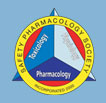|

SPS 2007 Sponsors
Diamond
($10,000 +)







Emerald
$7,500 to $9,999


Ruby
$5,000 to $7,499









Opal
$3,000 to $4,999






Sapphire
Up to $2,999



Lewis
B. Kinter &
Terry Timberlake-Kinter



|
Continuing Education
Wednesday, September 19, 2007
Sessions 1-4: 8:00 AM–12:00 NOON
Lunch Break
Sessions 5-8: 1:00 PM–5:00 PM
Annual SPS Reception to follow
Introduction to Safety Pharmacology
Morning Courses
| AM1: Introduction
to Safety Pharmacology—The ICH
S7A Core Battery |
Chair: Andy Sonderfan |
| |
This course is designed as a basic yet broad
survey of the history, theory, practice, and regulatory aspects of Safety
Pharmacology. Designed as an introduction for new
scientists in the discipline, the course will also be an effective refresher
for persons whose expertise may be limited to particular organ systems
or studies. The morning’s
presentations will elaborate Safety Pharmacology principles and methods using
practical lectures from expert scientists. Then, participants will be
divided into small groups,
where facilitated discussions will guide an examination of selected Safety Pharmacology
case studies.
|
|
| |
1. Course Welcome/Introduction |
Andrew Sonderfan, Synta Pharmaceuticals |
| |
2. Safety Pharmacology |
|
| |
a. Safety Pharmacology |
Andrew Sonderfan, Synta
Pharmaceuticals |
| |
b. Cardiovascular |
Herbert Himmel, Bayer HealthCare |
| |
c. CNS |
Bruce Morimoto, Allon Therapeutics |
| |
d. Respiratory |
Stephane Milano, MDS Pharma Services |
| |
e. Overview of Supplemental Studies (GI and Renal) |
Russell Bialecki,
AstraZeneca |
| |
3. Safety Pharmacology in Practice |
|
| |
4. Closing Remarks, Distribution of Certificates of Participation |
|
|
| AM2: Closing
The Gap between Biological Relevance and Statistical Significance:
Ideas/methods for Experimental Design, Data Collection and Data Analysis |
Chair: Brad Main |
| |
How can an assessment of safety be accomplished earlier
in drug development without increased cost? What are some ways to improve
the sensitivity of test systems? How can innovation be used to make safety
pharmacology more about selecting safe compounds rather than the process
of describing pharmacology on already selected candidates?
This class will look at ways to accomplish the challenges we have today
by exploring how to use such tools as PK/PD models and experimental design
to increase sensitivity without increasing the number of test subjects
on studies. Additionally we will look at the challenge of dealing with
very large data sets, and novel ways to evaluate safety data by visually
exploring parameter relationships. This course is targeted at individuals
who are familiar with the basics of safety pharmacology, but would like
to gain insight into using novel approaches to data collection and analysis. |
|
|
| AM3: Respiratory
Pharmacology |
Chair: Mike Stonerook |
| |
Current Methods for Assessing Respiratory Function in
Safety Pharmacology
Current methodologies for assessing respiratory function in safety pharmacology
will be presented. Appropriate animals models and methods for obtaining
direct measures of required endpoints will be covered. The rationale
for selecting specific tests and endpoints for assessing drug effects
on both ventilatory function and lung mechanics will be discussed. Specific
examples highlighting the importance of the functional endpoints will
also be presented. |
Dennis Murphy, GlaxoSmithKline |
| |
PathoPhysiology of the Pulmonary System
Presentation will discuss the pathophysiological changes in lung function,
mechanics, and gas exchange that occur in pulmonary disease. These
changes will be compared to changes in function as a result of toxicity
of the pulmonary system. |
Michael Stonerook, Vertex |
| |
Respiratory-Cardiovascular Interactions: Effect of Respiratory
Impairment on Cardiovascular Function
The heart and lungs are intimately linked—hydrodynamically, neurologically,
and humorally. As such, both acute and chronic alterations in lung function
can have cardiac implications, generally to maintain homeostasis. Maintaining
homeostasis under physiologic stress or with underlying disease of lungs
or heart can be difficult and may lead to further complication. |
Dan Costa, US EPA |
| |
Respiratory Function Changes During the Sleep State and
Potential for Unique Drug Effects
This presentation will discuss the changes in respiratory control that
occur with sleep state and discuss the potential mechanisms. Treatments
for respiratory disorders will be discussed with an emphasis on sleep
effects. |
Aidan Curran, Schering-Plough |
|
| AM4: Supplemental
Studies: Evaluation of Effects of NCEs on the Renal and Gastrointestinal
Systems |
Chair: JoAnne Saye |
| |
This course will be divided into 2 separate segments:
Evaluation of the renal and gastrointestinal systems. Although these
are not included in the core battery, it is not uncommon for new chemical
entities (NCEs) to produce side effects through interactions with the
renal or gastrointestinal systems. The purpose of this course is to provide
students with methods of assessing effects of NCEs on renal and gastrointestinal
physiology and the peripheral nervous system to determine their potential
for eliciting adverse effects in the human population. Each section will
provide some information on the anatomy, histology, and physiology of
the relevant system to highlight areas that are more vulnerable to insult.
Some case studies will be discussed to illustrate the relevance of the
non-clinical data to clinical data.
|
Aidan Curran, Schering-Plough |
| |
- Provide Information on Methods for Assessing The Potential
of NCEs to Adversely Affect Function of The Renal and Gastrointestinal
Systems
|
Lewis Kinter, AstraZeneca
and
Adrian Harrison, University of Copenhagen, Denmark
|
| |
- Provide Information on Data Interpretation of Methods
Discussed
|
|
| |
- Discuss the Value/Impact of These Data on The Overall
Safety Pharmacology Risk Assessment
|
|
| |
- Discuss The Plausibility of Including These Study Endpoints
As Part of Multiple dose toxicity studies
|
|
| |
|
|
|
Afternoon
Courses
| PM5: Intermediate Cardiovascular Safety Pharmacology:
ICH S7B |
Chair: Alf Botchway |
| |
This course is designed as an intermediate
level course and will focus on non-clinical testing studies for assessing
the potential to delay ventricular repolarization. As an intermediate
course, lectures will address in-vitro/ex-vivo electrophysiological and
in-vivo electrocardiogram evaluations. Model selection and data interpretation
will be a focal point of this course. Lectures will be combined with
case studies to illustrate “integrated” risk assessment during
which participants will work to discuss the design/interpretation of
cardiovascular (CV) safety pharmacology studies. This course is designed
to complement the ICH S7A course and therefore pertinent to persons wishing
to obtain an integrated viewpoint of both “cardio” and “vascular” aspects
of safety pharmacology. |
|
| |
- Course Welcome / Introduction
|
Alfred Botchway,
Xeno-Metrics
|
| |
- QT Prolongation and Torsade de Pointes: Scientific
Basis and Practical Aspects of In Vitro Studies
|
George Thomas, Calvert Laboratories |
| |
- In-vivo QT Assay; Telemetry
|
Alfred Botchway |
| |
- Left Ventricular Function Measurements in
Dogs, Monkeys and Rats
|
Bradley Main,
Eli Lilly
|
| |
- Cardiac Function: Haemodymanics and Electrophysiology
|
Michael Gralinski,
Cordynamics
|
| |
- Roundtable Discussion of Case Studies and
development of Integrated Risk Assessment
|
Faculty and Participants |
| |
- Closing Remarks, Distribution of Certificates
of Participation
|
Alfred Botchway,
Xeno-Metrics
|
|
| PM6: Intermediate
CNS Pharmacology |
Chair: Kristina Chadwick and Steve Hachtman |
| |
Given the complex and diverse functions of the central
nervous system, this course is designed to initially describe the methods
available for first line evaluation of the CNS (modified Irwin and Functional
Observational Battery). Following that introduction, the use of multidisciplinary
approaches including neurobiological, neurophysiological, neuropathological,
and/or behavior techniques will be described to go beyond the core battery
to assess the potential for adverse neurological effects such as learning
and memory deficits, seizure potential, abuse liability, and more. |
|
|
| PM7: General
Physiology |
Chair: Mike Stonerook |
| |
Cardiovascular Physiology
The course will discuss, for commonly-used laboratory animals, the aspects of cardiovascular function that might be affected adversely by drugs/test articles, how they are measured, what determines them, what are normal values, and how deviations may translate to morbidity and/or mortality. Emphasis will be placed on heart rate and rhythm, systemic and pulmonary vascular resistances and pressures, inotropy, lusitropy, myocardial energetics, baroreceptor function. |
Robert Hamlin, Ohio State University |
| |
Pulmonary Physiology
The course will describe the basic function of the pulmonary system and the mechanisms of gas exchange. The interactions of the pulmonary system with the nervous and cardiovascular systems will be explored. Basic parameters of pulmonary function commonly measured in Safety Pharmacology studies will be described and their relation to pulmonary physiology explored. |
Michael Stonerook, Vertex |
| |
CNS Physiology
A basic CNS lecture reviewing concepts in brain/spinal cord organization, neurotransmitters
and behavioral expression. Overviews of measurable atypical phenotypic endpoints
identified from FOB domain groupings will be examined. Common applications in
tiered approach CNS testing modalities to evaluate learning, memory, and motor
function will also be assessed. |
Tiffani Brahbham, Pfizer |
| |
Renal Physiology
The course will describe the basic function of the kidney and its role in maintaining normal fluid and electrolyte homeostasis in the body. Basic parameters of renal function commonly measured in Safety Pharmacology studies will be described. In addition, the physiologic implications of drug-induced changes in renal function will be defined along with the relevance of these measurements to a Safety Pharmacology program. |
Glen Reinhart, Boehringer-Ingelheim |
|
| PM8: Advanced
Topics in SP: Case Studies from Drug Selection to NDA |
Chairs: Rick Briscoe and Hugo Vargas |
Chairs: Rick Briscoe and Hugo Vargas
| |
This course is designed as an advanced level course and
will focus on the results of non-clinical Safety Pharmacology studies
and how these studies impact drug selection, clinical development and
registration of pharmaceuticals. To realize the most benefit from the
course attendees should have a general Safety Pharmacology background
and understand the basic core battery assessments described in ICH S7A
and S7B guidelines. A basic understanding of the stages of clinical development
would also be useful.
A mixture of scenarios from various stages of drug development will
be presented and discussed in the context of how to work through problematic
Safety Pharmacology data utilizing follow-up Safety Pharmacology and/or
clinical studies. The intent of this course is as an interactive facilitated
discussion. The course instructors will present scenarios and facilitate
the discussion with course participants. Course participants are encouraged
to submit brief cases (3 to 4 PowerPoint slides) to the course facilitators
prior to the meeting to allow broader experiences for the discussion.
Topics may include examples with effects in the cardiovascular, respiratory
or central nervous systems. |
|
|
|